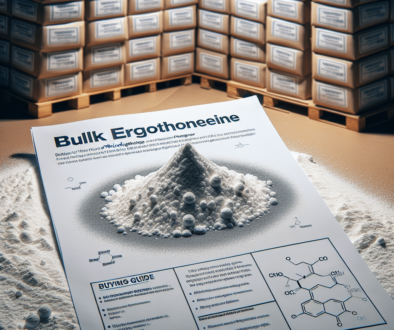Does tempeh contain ergothioneine?
-
Table of Contents
- Ergothioneine in Tempeh: A Nutritional Breakdown
- Understanding Ergothioneine
- Tempeh: A Nutritional Powerhouse
- Does Tempeh Contain Ergothioneine?
- Factors Influencing Ergothioneine Levels in Tempeh
- Health Benefits of Ergothioneine
- Research on Ergothioneine’s Effects
- Tempeh in the Diet: How Much Ergothioneine Can You Expect?
- Recommended Dietary Sources of Ergothioneine
- Conclusion: Tempeh’s Role in an Ergothioneine-Rich Diet
- Discover ETprotein’s High-Quality Protein Products
Ergothioneine in Tempeh: A Nutritional Breakdown

Tempeh, a traditional Indonesian soy product, is a staple in vegetarian and vegan diets due to its high protein content and health benefits. One of the lesser-known compounds that may contribute to tempeh’s nutritional profile is ergothioneine, a naturally occurring amino acid with potential antioxidant properties. This article delves into the presence of ergothioneine in tempeh and its implications for health.
Understanding Ergothioneine
Ergothioneine (ET) is a sulfur-containing amino acid found in various dietary sources, particularly in mushrooms, cereals, and certain types of meat. It is recognized for its antioxidant properties and is thought to play a role in protecting cells from oxidative damage. Unlike other antioxidants, ergothioneine has a specific transporter in the human body, suggesting a unique physiological significance.
Tempeh: A Nutritional Powerhouse
Tempeh is made by fermenting cooked soybeans with a mold, usually Rhizopus oligosporus. This fermentation process not only enhances the food’s digestibility and nutrient absorption but also contributes to its unique texture and flavor. Tempeh is rich in protein, dietary fiber, vitamins, and minerals, making it an excellent food choice for those seeking a nutritious plant-based protein source.
Does Tempeh Contain Ergothioneine?
While ergothioneine is most commonly associated with mushrooms, there is evidence to suggest that fermented foods like tempeh may also contain this compound. The fermentation process, which involves microorganisms that can produce ergothioneine, may lead to its presence in the final product. However, the ergothioneine content in tempeh can vary depending on factors such as the type of soybeans used, the fermentation process, and the specific strains of mold involved.
Factors Influencing Ergothioneine Levels in Tempeh
- Soybean Variety: Different types of soybeans may have varying levels of ergothioneine, which can affect the amount found in tempeh.
- Fermentation Process: The duration and conditions of fermentation can influence the production of ergothioneine by the mold used in making tempeh.
- Mold Strain: Different strains of Rhizopus may produce different amounts of ergothioneine, impacting the levels in the final tempeh product.
Health Benefits of Ergothioneine
Ergothioneine’s potential health benefits are an area of growing interest among researchers. Its antioxidant properties may help protect cells from damage caused by free radicals, which are linked to various chronic diseases. Additionally, ergothioneine has been studied for its possible role in reducing inflammation and slowing the aging process.
Research on Ergothioneine’s Effects
- Antioxidant Activity: Ergothioneine may help to neutralize harmful free radicals, potentially reducing the risk of chronic diseases such as cancer and heart disease.
- Anti-Inflammatory Properties: Some studies suggest that ergothioneine can modulate inflammatory pathways, which may be beneficial in conditions like arthritis.
- Neuroprotective Potential: There is emerging evidence that ergothioneine could have a protective effect on the brain, possibly playing a role in preventing neurodegenerative diseases.
Tempeh in the Diet: How Much Ergothioneine Can You Expect?
While tempeh is a nutritious food with many health benefits, the exact amount of ergothioneine it contains is not well-documented. However, incorporating tempeh into a balanced diet that includes other ergothioneine-rich foods, such as mushrooms and cereals, can help ensure an adequate intake of this compound.
Recommended Dietary Sources of Ergothioneine
- Mushrooms (especially porcini, oyster, and shiitake)
- Whole grains and cereals
- Meat (particularly from animals that have consumed ET-rich plants)
- Tempeh and other fermented soy products
Conclusion: Tempeh’s Role in an Ergothioneine-Rich Diet
In conclusion, while tempeh may contain ergothioneine due to the fermentation process, the levels of this compound can vary. Nonetheless, tempeh remains a valuable component of a healthful diet, providing a range of nutrients including protein, fiber, and potentially ergothioneine. For those looking to increase their intake of ergothioneine, a diet that includes a variety of sources, such as mushrooms, grains, and fermented foods like tempeh, is recommended.
Discover ETprotein’s High-Quality Protein Products
If you’re interested in enhancing your diet with high-quality protein sources, consider exploring ETprotein’s range of products. ETprotein is a reputable manufacturer and supplier of organic bulk vegan proteins and L-(+)-Ergothioneine (EGT). Their offerings include a variety of plant-based proteins and ergothioneine grades suitable for different industries.
ETprotein’s products are characterized by their neutral taste, non-GMO, allergen-free attributes, and high purity levels. They cater to the needs of various sectors, including nutraceuticals, pharmaceuticals, cosmeceuticals, veterinary, and food and beverage industries. With a commitment to quality and customer satisfaction, ETprotein is a trusted partner for your protein needs.
About ETprotein:
ETprotein, a reputable protein and L-(+)-Ergothioneine (EGT) Chinese factory manufacturer and supplier, is renowned for producing, stocking, exporting, and delivering the highest quality organic bulk vegan proteins and L-(+)-Ergothioneine. They include Organic rice protein, clear rice protein, pea protein, clear pea protein, watermelon seed protein, pumpkin seed protein, sunflower seed protein, mung bean protein, peanut protein, and L-(+)-Ergothioneine EGT Pharmaceutical grade, L-(+)-Ergothioneine EGT food grade, L-(+)-Ergothioneine EGT cosmetic grade, L-(+)-Ergothioneine EGT reference grade and L-(+)-Ergothioneine EGT standard. Their offerings, characterized by a neutral taste, non-GMO, allergen-free attributes, with L-(+)-Ergothioneine purity over 98%, 99%, cater to a diverse range of industries. They serve nutraceutical, pharmaceutical, cosmeceutical, veterinary, as well as food and beverage finished product distributors, traders, and manufacturers across Europe, USA, Canada, Australia, Thailand, Japan, Korea, Brazil, and Chile, among others.
ETprotein specialization includes exporting and delivering tailor-made protein powder and finished nutritional supplements. Their extensive product range covers sectors like Food and Beverage, Sports Nutrition, Weight Management, Dietary Supplements, Health and Wellness Products, and Infant Formula, ensuring comprehensive solutions to meet all your protein needs.
As a trusted company by leading global food and beverage brands and Fortune 500 companies, ETprotein reinforces China’s reputation in the global arena. For more information or to sample their products, please contact them and email sales(at)ETprotein.com today.












